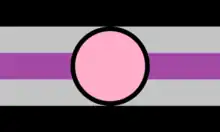Fictosexuality
Fictosexuality is characterized by sexual attraction towards fictional characters.[1][2][3] Romantic attraction to fictional characters is called fictoromantic.[3]

Fictosexuals have formulated the concept of human-oriented sexualism[lower-alpha 1] as the prevailing normative sexuality centered around sexual attraction towards flesh-and-blood humans.[2] This is the term used to describe the marginalization of fictosexuality.[1][5][6] The concept of human-oriented sexualism can be understood as a combination of the idea of compulsory sexuality[lower-alpha 2] from asexual research and the notion of humanonormativity[lower-alpha 3] from objectum sexuality research.[6][9]
The objects of sexual attraction for fictosexuals are not real human beings or substitutes for real humans, but non-human artifacts, specifically fictional characters.[1][5]
Terms in different languages
In Chinese, the term 紙性戀; zhǐxìngliàn; 'fictosexuality'[lower-alpha 4] specifically refers to sexual attraction towards two-dimensional characters only.[10] In Japanese, フィクトセクシュアル (fikutosekushuaru), an assimilation of the word fictosexuality associated with Nijikon, which is typically used to describe a sexual attraction towards two-dimensional anime, manga, and light novel characters, as opposed to attraction towards flesh-and-blood human.[5][11] However, the term fikutosekushuaru is distinct from "otaku" and specifically pertains to a sexual identity.[2][6]
Meanwhile, in English, fictosexuality includes attraction to fictional characters in various kinds of narratives, such as novels, and is not limited to attraction to two-dimensional characters.[12]
Research
Feminist and queer research
Several asexual studies and introductory books on sexual minorities refer to fictosexuality.[3][13][14][15]
Queer theoretical research has also been conducted. In her analysis of the notion of "animation" put forth by Teri Silvio and Hiroki Azuma's interpretation of Jacques Derrida, sociologist and queer theorist Yuu Matsuura argues that sexual attraction to fictional characters subverts established norms in a different manner from Judith Butler's performativity.[5] The subversion is "transforming the method of perception or the way of desire through animation constructing the beings of a category that did not exist before."[16][1] Matsuura also posits a theory that human-oriented sexualism is linked to heteronormativity and gender binarism.[5][6][17]
Through interviews conducted with fictosexual individuals, Matsuura discovered that they face the same forms of oppression due to compulsory sexuality as asexual individuals do.[11] Furthermore, it was also observed that sexual desire does not always entail a desire for sexual intercourse.[11] Interview surveys indicate that the practices of fictosexual individuals present some possibilities to challenge compulsory sexuality and human-oriented sexualism.[11][10]
Relationships with fictional characters
Karhulahti et al. state that fictosexual individuals "do not 'confuse fiction and reality,' but overtly address the parasocial nature of their relationship. However, for some individuals, their sexual attraction toward the characters may generate discomfort since they cannot interact with the characters in the same way as they do with their human peers."[12] This contradiction is referred to as the "fictophilic paradox".[12] This notion has been corroborated by research conducted in Taiwan.[10]
However, the relationship between fictosexual individuals and fictional characters is not always a simple one-way relationship.[10] It has been observed that they experience emotional connection and sense the presence of these characters through various mediums, such as interfaces or character items, and also through practices like derivative work.[12][10] It has been suggested that the relationship between fictosexual individuals and fictional characters can be understood through the lens of "relational epistemology" or "dividual" in anthropology.[10]
On the other hand, just as not all allosexuals desire sexual contact, some fictosexual individuals do not desire interactive relationships with fictional characters.[11] [2]
Criticism, discrimination and stigmatization

Fictosexuals have been marginalized or concealed in societies that adhere to the norm of sexual attraction to human beings. They are occasionally stigmatized or pathologized.[1][2][12] Fictosexuals also face prejudice from the LGBT community.[1] Fictosexuality is often thought of as a preference[2] and excluded from the LGBT community.[1][2]
Additionally, the sexual attraction towards fictional characters can be misrepresented as a mere inclination towards a human depicted in a particular style, whereas actually the attraction is directed towards a non-human entity.[1][5] Some researchers and activists argue that considering the attraction to fictional underage characters as equivalent to a desire for a human child reflects an human-oriented sexualist biased view.[1][2][5][lower-alpha 5]
Community and activism
Online communities and forums about fictosexuality exist.[12][2] Karhulahti et al. states that these online communities serve as support platforms that help alleviate the distress caused by stigma.[12]
Additionally, some fictosexuals are participants in the asexual community.[3] In asexual community, the term fictosexuality is often utilized as a microlabel in the asexual spectrum, describing people who experience sexual attraction exclusively to fictional characters and not to real people. [2][3][12][13]
Criticism of human-oriented sexualism rebuts the assumption that ACG pornography sexualizes real women and promotes pedophilia,[2][5] while simultaneously denouncing rape culture.[2] This critique is oriented towards solidarity with the feminist and LGBTQ movements.[1][17]
See also
Explanatory notes
- The term human-oriented sexualism (対人性愛中心主義, taijin seiai chūshin shugi) originated from online posts by fictosexual individuals in Japan and was translated in the past as interpersonal sexuality centrism.[4]
- Compulsory sexuality is "the social expectation that sexuality is a universal norm, that everyone should be sexual and desire sex, and that to not be sexual or desire sex is inherently wrong and in need of fixing".[7]
- Humanonormativity is "the belief that people normally and naturally engage in sexual practices and romantic relationships with other human beings. This is not a norm that constructs such sexualities as superior to just engaging in sexual acts with animals (zoophilia)."[8]
- "Zhǐ" (紙) means paper and "xìngliàn" (性戀) means sexuality.
- Yuu Matsuura criticizes the "asymmetry wherein hentai content is subject to unilateral problematizing, while human-oriented sexuality is presumed as self-evident" and presents an ethical question, "Why is the issue that hentai content purportedly causes not labeled as the 'human-oriented sexuality issues'?"[5]
References
- SH Liao (廖 希文) (2023). "Fictosexual Manifesto: Their Position, Political Possibility, and Critical Resistance". NTU-OTASTUDY GROUP. Retrieved 2023-05-09.
- Matsuura, Yuu (2021). 日常生活の自明性によるクレイム申し立ての「予めの排除/抹消」――「性的指向」概念に適合しないセクシュアリティの語られ方に注目して ["Foreclosure/Erasure" of Claims-Making by the Everyday Life as Taken for Granted: Discourse Analysis about "Fictosexual" as Sexuality that does not Conform to "Sexual Orientation"]. Journal of Social Problems (in Japanese). 36: 67–83. doi:10.50885/shabyo.36.0_67.
- Yule, Morag A.; Brotto, Lori A.; Gorzalka, Boris B. (2017). "Sexual Fantasy and Masturbation Among Asexual Individuals: An In-Depth Exploration" (PDF). Archives of Sexual Behavior. 46: 311–328. doi:10.1007/s10508-016-0870-8. PMID 27882477. S2CID 254264133.
- Matsuura, Yuu (2023). "Basic Terms of Fictosexuality Studies". researchblog (researchmap). Retrieved 2023-10-21.
- Matsuura, Yuu (2022). アニメーション的な誤配としての多重見当識:非対人性愛的な「二次元」へのセクシュアリティに関する理論的考察 [Multiple Orientations as Animating Misdelivery: Theoretical Considerations on Sexuality Attracted to Nijigen (Two-Dimensional) Objects]. Gender Studies (Thesis) (in Japanese). Institute for Gender Studies, Ochanomizu University. pp. 139–157. doi:10.24567/0002000551.
- Matsuura, Yuu (2023). "Basic Terms of Fictosexuality Studies". researchblog (researchmap). Retrieved 2023-10-21.
- Pryzybylo, Era (2022). "Unthinking compulsory sexuality: Introducing asexuality". In Fischer, Nancy L.; Westbrook, Laurel; Seidman, Steven (eds.). Introducing the New Sexuality Studies (4th ed.). Routledge.
- Motschenbacher, Heiko (2018). "Language and Sexual Normativity". In Hall, Kira; Barrett, Rusty (eds.). The Oxford Handbook of Language and Sexuality. Oxford University Press. doi:10.1093/oxfordhb/9780190212926.013.14. ISBN 978-0-19-021292-6.
- Matsuura, Yuu (2023). 対人性愛中心主義批判の射程に関する検討――フェミニズム・クィアスタディーズにおける対物性愛研究を踏まえて [Humanonormativity and Human Oriented Sexualism: A Discussion Based on Objectum Sexuality Studies from a Feminist and Queer Perspective]. Human Science Sociology and Anthropology (in Japanese). Faculty of Human-Environment Studies, Kyushu University (13). doi:10.15017/7151776.
- 廖 希文 (SH Liao) (2023). 紙性戀處境及其悖論: 情動、想像與賦生關係 [On Fictosexual Position and its Paradox: Affacts, Imaginary, and Animating Relationships]. 動漫遊台灣2023:台灣 ACG 的過去、現在與未來 (研討會論文) (in Chinese).
- Matsuura, Yuu (2021). 二次元の性的表現による「現実性愛」の相対化の可能性――現実の他者へ性的に惹かれない「オタク」「腐女子」の語りを事例として [The Possibility of Relativization of Compulsory Sexuality by Nonrealistic Sexual Fantasy: Based on the Narration of "Otaku" and "Fujoshi" Who Do Not Experience Sexual or Romantic Attraction to Real People]. Japan Sociologist (in Japanese) (5): 116–136. ISBN 9784788517073.
- Karhulahti, Veli-Matti; Välisalo, Tanja (2021). "Fictosexuality, Fictoromance, and Fictophilia: A Qualitative Study of Love and Desire for Fictional Characters". Frontiers in Psychology. 11. doi:10.3389/fpsyg.2020.575427. PMID 33510665.
- Daigle-Orians, Cody (2023). I Am Ace: Advice on Living Your Best Asexual Life. Jessica Kingsley Publishers.
- Matsuura, Yuu (2020). アセクシュアル研究におけるセクシュアルノーマティヴィティ概念の理論的意義と日本社会への適用可能性 [The Concept of Compulsory Sexuality: Theoretical Meaning and Applicability to Japanese Society]. Journal of Sociological Society of West Japan (in Japanese). 18: 89–101. doi:10.32197/sswj.18.0_89.
- Palettalk (2021). マンガでわかるLGBTQ+ [Comic Book for Learning LGBTQ+] (in Japanese). Kodansha Ltd. p. 35. ISBN 9784065224922.
- Matsuura, Yuu (2022). メタファーとしての美少女:アニメーション的な誤配によるジェンダー・トラブル [Bishōjo as Metaphor: Gender Trouble by Animating Misdelivery]. La revue de la pensée d'aujourd'hui (in Japanese). 50 (11): 63–75. ISBN 9784791714353.
- Matsuura, Yuu (2022). 対人性愛中心主義とシスジェンダー中心主義の共通点:「萌え絵広告問題」と「トランスジェンダーのトイレ使用問題」から [The Common Point between Human-oriented Sexualism and Cisgender-Centrism] (in Japanese). Retrieved 2023-05-09.